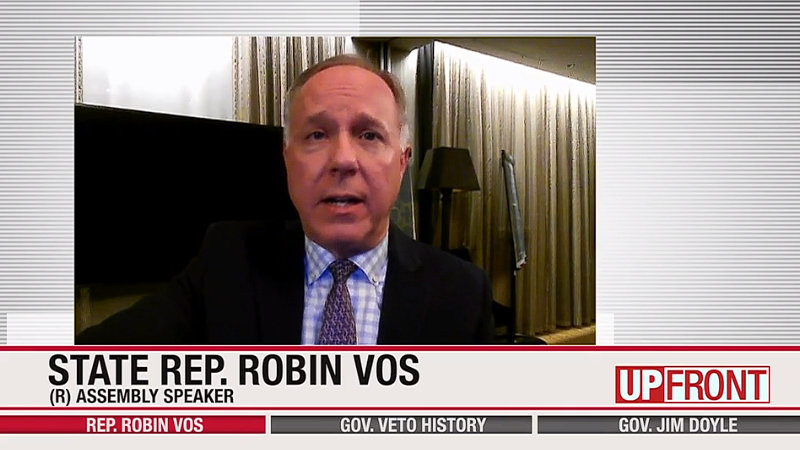Assembly Speaker Robin Vos says Republicans are preparing to sue over Gov. Tony Evers’ partial veto that increases public school funding for 402 years, saying he sees “very little option left but to go to the courts.”
“When you say he has the broad authority, that is clearly in question,” Vos said on WISN’s “UpFront,” which is produced in partnership with WisPolitics. “We do not know that. He has taken the broad authority, but it doesn’t mean that it’s right.”
Vos said Republicans will also consider introducing a proposed constitutional amendment to further limit the partial veto powers of Wisconsin’s governor.
“I never thought it was necessary, frankly,” Vos said, referring to a constitutional amendment that would require passage from two consecutive sessions of the Legislature before going to voters. “This is something that is unprecedented. Gov. Evers has taken this to a new level. Talking about how the Legislature is undemocratic, well, having one person using a creative veto that is clearly in question — we won’t know until the court says whether it’s constitutional — but it’s clearly questionable.”
>> WisPolitics is now on the State Affairs network. Get custom keyword notifications, bill tracking and all WisPolitics content. Get the app or access via desktop.
Evers’ education veto was one of 51 partial vetoes he issued. He increased the amount public school districts can raise by $325 per student each year through 2425 by striking a dash and “20” from the original 2024-25 language.
In doing so, Vos accused Evers of lying to Republican leaders during private negotiations surrounding the shared revenue agreement and education funding, a claim Evers called “breathtaking” Friday in response to Vos’ “UpFront” interview, telling WISC-TV, “I never lied.”
“He lied to the people of Wisconsin in the campaign last year,” Vos said. “He lied to us during the negotiation process, and now it really calls into question his ability to try to find bipartisan compromises like we’ve been working on this entire year.”
Vos also acknowledged it would be “unlikely” to override any of Evers’ vetoes, given Assembly Republicans would need at least three Democrats to join them in voting to override.
Former Dem Gov. Jim Doyle on the program argued what Evers did is perfectly legal, saying the education veto was “not that unusual.”
“Oh yes,” Doyle, who was also attorney general, said when asked whether the veto was legal. “I mean, this has been upheld many, many times now. Unless the court goes against all the precedence that’s been laid down for many, many years, I don’t think there’s any question about it.”
Doyle issued nearly 400 partial vetoes during his term, including one in the 2005 budget that pieced together 20 words from within 752 to create an entirely new sentence that diverted $427 million from the transportation fund to the general fund, which was used to fund public schools.
“It’s interesting because that fight is the same fight we’re having for years, where Republicans for years have been cutting money out of school funding,” Doyle said. “And every year, they would send me a budget that would cut the schools, and I would have to find a way to continue to fund the public schools in Wisconsin.”
The move, which became known as the “Frankenstein veto,” and used by numerous administrations, was rolled back and prohibited by voters in a constitutional amendment in 2008.
Doyle, though, argues the governor’s power should remain.
“The federal government, everybody wants a partial veto in the federal government on the budget,” Doyle said. “If the Legislature thinks the governor is wrong, they can override the veto. The Legislature has the ultimate authority on this.”
Another segment of the program focused on how more Wisconsin tribes are quietly pursuing moves that could legalize the use and sale of marijuana on tribal land, despite marijuana being illegal in Wisconsin and federally.
“The tribes in our states have been asking a lot of questions, and there’s tribes, friendly tribes in the Great Lakes region that are operating already,” said Rob Pero, CEO and founder of Wisconsin-based Indigenous Cannabis Industry Association.
The group is holding a private policy roundtable this week as certain tribal leaders consider moving forward with legalization and retail before any state action.
“I think that’s definitely a possibility, and that’s what’s really exciting about it,” Pero said. “This is the first time ever you’ve seen tribes kind of look to pool resources around emerging industries that we know can build economies. And this isn’t just selling weed at the gas station. This is medicine, this is industrial hemp, this is housing, biofuels. This is making our communities healthier, reducing the opioid epidemic. So tribes are really looking at this as a way to make their communities healthier, better and stronger, and they’re not going to wait on the state to let them decide on when that’s the right time.”
See more from the show:
https://www.wisn.com/upfront



